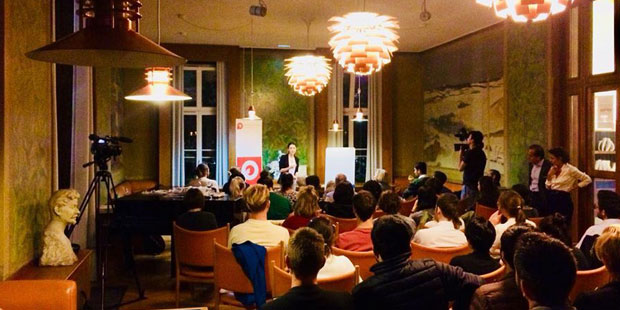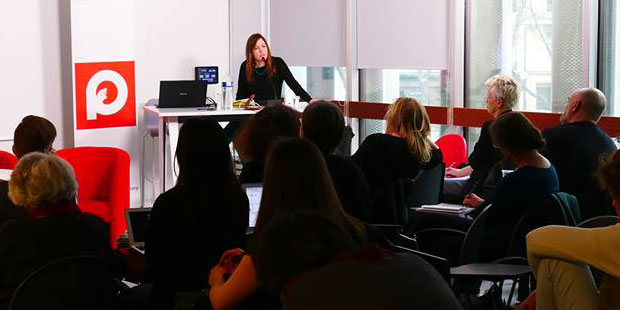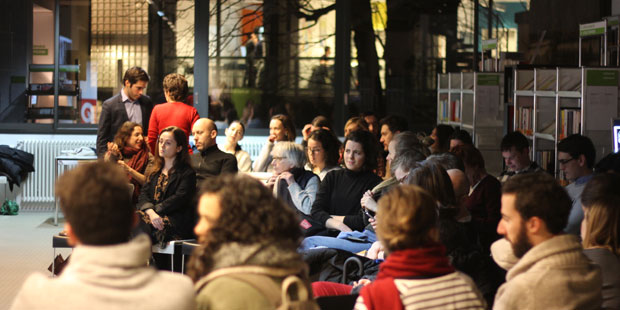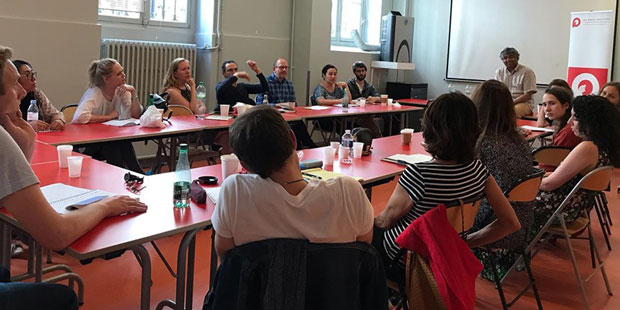"The value of PICT lies not in a diploma but in our teachers"
Located in France, the Paris Institute for Critical Thinking reimagines the academy as a venue of learning for its own sake. Co-founders Evrim Emir-Sayers and David Selim Sayers discuss the birth of the institute, their schedule, and why we need independent venues to foster critical thinking
The Paris Institute for Critical Thinking (PICT) is an independent and non-profit educational organization based in Paris, France. “What we need today, especially in the humanities, are anti-institutions ... as stated in our manifesto, PICT exists to connect teachers and learners before getting out of their way,” remark Evrim Emir-Sayers and David Selim Sayers, co-founders and core faculty members of the institute.
Most universities are run like businesses nowadays. Evrim Emir and David Selim say they had "an aha-moment" one day while discussing the repercussions of such a phenomenon and set off to be "a part of the solution." And thus PICT was born.
Already in its second year, PICT reimagines the academy as a venue of learning for its own sake, and offers a rather wide array of unstandardized courses –from the philosophy of art to the birth of the zoo- to that end.
Here’s a closer look at the Paris Institute for Critical Thinking.

What is the Paris Institute for Critical Thinking?
PICT is a non-profit educational institute located in Paris, France. We are focused on the humanities and arts, and all our programming is in the English language. Our instructors are recognized experts in their fields, and the quality of our courses is at university level. But in contrast to a university, PICT does not have prerequisites for its courses, meaning that we welcome participants of all ages, educational backgrounds, and walks of life.
Our regular courses are 18 hours long, which corresponds to a one-semester course at a European university or a half-semester course at a US university. Past courses have been on topics such as Existentialism, Gender in the Middle East, and Women Authors of Surrealism. We also organize events in other academic formats, such as workshops, conferences, and public lectures. One of our workshops is a two-day, intensive workshop on Creative Writing. We have already held two half-day conferences, one on the Neurosciences and the other on Critical Thought at the University. And our public lectures have focused on a wide range of topics from Identity Politics to Islamic Art. Since PICT is a non-profit institute, most of these events are free and open to the public.
As we just said, PICT is an independent and non-profit institute. This means, first of all, that PICT is not attached to or funded by any university, government, or other administrative body. Secondly, it also means that all of PICT’s income is invested back into educational activities. Thanks to this structure, we can design our programming without administrative, financial, or political concerns.
Many university administrations insist on maximizing class sizes: essential but low-enrolled courses cannot be opened because they do not generate sufficient profit for the university. We don’t have this problem. Quite the opposite, in fact: we believe that critical thinking can only be practiced in small, seminar-style classes, so we cap our class sizes at 15. Another advantage, of course, is political freedom. Universities in academically unfree countries like Turkey are harshly circumscribed by the state, but even in countries that enjoy greater freedom, universities often accept large donations from states or other organizations, which leads to self-censorship on controversial topics. At PICT, we are free to teach what we like.

How did PICT come about?
Our founders include many young academics who have taught at universities around the world, in countries such as Austria, France, Germany, Italy, Scotland, South Africa, Turkey, and the USA. As years went by and we kept sharing our experiences with each other, we realized that we were all deeply dissatisfied with the university structure as it stands. To us, the academy should be a place where people go to discover themselves, develop their characters, and give free rein to their personal and intellectual curiosity. It should be a place to practice unquantifiable skills such as critical and creative thinking, skills that can be applied to all pursuits and interests, skills that form the bedrock of a fulfilling life.
Unfortunately, higher education today has drifted very far from this model. Most universities are run like businesses now, and profitability has become their main concern. The product they sell is not education but a diploma. People pay for this diploma because they hope it will help them find a job, and they come to universities for it because they can’t get it anywhere else. As a result, universities view students and their families as paying customers, and themselves as gatekeepers to the job market.
This gatekeeper position enables universities to keep increasing their prices while, at the same time, cheapening their product. Professors with good wages and job security are replaced by underpaid, seasonal adjunct instructors. Class sizes grow while individual students receive less and less attention. And students are processed through the system as quickly as possible through dumbed-down survey courses and grade inflation.
But students aren’t stupid. They realize that the modern university is little more than a diploma factory, and as a result, they try to obtain their ticket to the job market as cheaply and quickly as possible. Of course, the more diplomas are issued, the more their value decreases. People are beginning to see this now. They are starting to see that this piece of paper—which everybody has anyway—is just not worth the investment of time and money.
One day, while discussing these issues, we had an aha-moment. Why keep complaining about these things, we said, when we are part of the system ourselves? Why be a part of the problem if, perhaps, we could be part of the solution? This is how PICT was born—as an academy in the original sense; a venue of learning for learning’s sake, of thinking for thinking’s sake; a place where people gather not to get credit or a diploma, but because they share our passionate interest in intellectual inquiry. Immediately, we started calling up friends and colleagues who might participate. Within a week, the core faculty was complete. By the end of the month, we’d already registered as a non-profit association. And four months later, we held our first event.
And why in Paris?
This question has two answers, one rather simple, the other more complicated. The simple answer is that we love Paris! We (Evrim and David) moved here three years ago because of the city’s immense cultural, artistic, intellectual wealth and beauty. Paris is, without a doubt, one of the main cultural hubs of the world. We left behind our safe university jobs in San Francisco and took a plunge, coming here on zero budget, with no jobs waiting for us, and trusting ourselves to work things out as we went along. We gambled big on Paris—that’s how much we love the city!
The complicated answer takes its cue from the simple one. The city of Paris is aware of its cultural capital and wants to maintain it. And it knows that, in order to maintain this capital, it needs people like us, people who will add depth, color, and diversity to the city’s cultural brand. As an association, we’ve been able to organize ourselves very quickly and receive recognition from various branches of the French administration. Apart from our status as a non-profit educational association, we have also secured registration as a provider of continuing professional education. This means participants in PICT courses can get their enrollment fees reimbursed by the companies they work for. In many ways, establishing PICT proved much less bureaucratic than establishing ourselves as private individuals in France—for instance, the PICT bank account was much easier to open than our own, private account!
The city of Paris is so closely associated with culture and intellectualism that it serves as a veritable brand—the word “Paris” probably lends more prestige to an educational institution than the word “university.” And that is not without reason. At PICT, we are able to connect our courses to the best aspects of the city. For instance, a PICT course on the paintings of Paul Cézanne is in walking distance to the greatest Cézanne collections in the world. Finally, Paris attracts scholars and intellectuals from around the world, and we can tap into this academic stream. Many colleagues passing through are keen to support a non-profit like PICT by delivering guest lectures and seminars.
There is one issue with Paris, though: most of its amazing offerings in the fields of culture and philosophy are only fully accessible to those who speak fluent French. And that is not the case with most people who move to Paris from outside or are just staying in the city for a few days, weeks, or months. The lingua franca of these people is not French but English. There is a need for individuals and institutions that will translate, literally and metaphorically, the Parisian wealth of culture for an international audience. We all know the names of anglophone authors like James Joyce, Gertrude Stein, or Henry Miller, who have served such a function as bridge. PICT sees itself as a continuation of this tradition, as a rallying point for intellectual seekers from around the world, and as an entry point for them into the cultural world of Paris.

Who teaches at PICT?
Misfits, really! Well, the kinds of eccentric intellectuals whose home used to be the university, but who cannot really fit in the university system anymore. People who aren’t too comfortable in readily established worlds, people who are engaged in building their own world of the mind. PICT is not a home for one-dimensional, overly specialized scholars. Especially in the humanities, overspecialization is deadly. Neither is PICT a home for people who view teaching and scholarship as a career path, people who let their research interests be determined by funding concerns. We need nerds, people who are deeply passionate about what they study and teach. And we need holistic scholars, the renaissance people of today.
In fact, a critical thinker needs to be a holistic thinker; both in the sense of approaching various topics, and in the sense of approaching a single topic from various angles. Such critical thinkers can emerge at the least expected times and circumstances—and they are not always people with Ph.D.’s. Our speakers have included a chemical engineer who became a collector of antique lamps and now uses his combined knowledge of chemistry and history to organize guided tours at his own lamp museum. They have included professional make-up artists who deliver lectures on vintage make-up, not only the original materials and their application, but also the socio-historical circumstances influencing the evolution of style. We guarantee the quality of our instructors not on the basis of their CV, but of our interaction with them and our assessment of their vision.
We believe that ultimately, learners will come for the teachers rather than the courses. If we think of our former schools, most of us will probably remember some remarkable teachers. Courses, not so much. It is the presence and passion of such teachers, combined with the right topic, that awakens many of us to the deepest interests of our lives. This is because teaching is not about conveying some pre-determined information in a pre-determined way, with the instructor merely a replaceable medium executing an approved curriculum and a lab-tested teaching method. Teaching is about modeling, about a live thinker performing the act of critical and creative thinking in real time, in front of you, and with you. Clearly, course topics are important and our topics are chosen according to our instructors’ passionate interests. But our chief concern is not what to think, but how to think. We’ve got the internet for the what. But the how is something we can only learn from each other, in the presence of each other.
One factor that influences our choice of instructors is the still-pervasive atmosphere of sexism in academia. There is no intrinsic difference between the critical thinking capacities of women and men. It would stand to reason, then, that there should be as many women in academia as men. But we see that the hierarchical structure of universities still produces crass inequalities of gender. Women are underrepresented in many fields, while they are overrepresented—read ghettoized—in others. For this reason, it is important to us to give fair and equal representation to women among the PICT faculty. We implement a degree of gender parity that older and more complex institutions, due to their historical path dependences, find hard to achieve.
Another consideration is the current, abysmal state of the academic job market. While our visiting speakers often have secure—and sometimes prestigious—positions at universities, most of our full-length courses are taught by scholars with recent Ph.D.’s. It is no secret that, especially in the humanities, universities produce many more Ph.D.’s every year than the academic job market can absorb. Instead of pouring their energies into their work, these people find themselves hunting for postdocs or adjunct teaching positions. Those who are lucky enough to find such teaching work are hired on a semesterly basis with no job security and are paid by the course rather than receiving a fixed salary. Often, they have to find second jobs or piece together teaching work on various campuses just to make ends meet. Their workload makes it hard for them to continue the research they need to advance their careers. And even their teaching has little to do with their research because they are assigned introductory courses that more senior faculty refuse to teach.
At PICT, such promising young scholars teach according to their own passions. Whenever we interview a prospective instructor, our key question is, “if somebody said you could teach whatever you wanted, what would you teach?” Some think it’s a trick question and start to rattle off courses that would be required at a university. But it’s actually an honest question—we’re asking about the course they will teach at PICT. Our emphasis on the instructor’s person isn’t just about course content, but also includes our model of remuneration. As a non-profit, we channel the majority of enrollment fees directly to the instructor, keeping only what is needed to cover the institute’s running costs. And although we cap enrollment at fifteen to foster an atmosphere of critical exchange, even a PICT instructor with only two students earns roughly as much as an adjunct instructor teaching the same course at a French state university.
PICT offers courses and talks on various subject matters- e.g., gender in the Middle East, women authors of surrealism, Kierkegaard, and make-up through the decades. How did you decide on the courses; what were your motivations?
Our course program is focused on the humanities and arts, including topics such as philosophy, cultural studies, literature, music, painting, and cinema. In particular, we seem to be becoming a magnet for continental philosophy, and we’re very happy about that. Why do we focus on the humanities? Well, first of all, because we regard the humanities as the natural home of critical thinking, in contrast to the sciences or vocational studies like medicine and engineering, where thinking is led down more or less rigidly defined paths in the quest for quantifiable results. Of course, this kind of thinking has its value in human endeavor, but it isn’t critical thinking as we understand it.
Secondly, the humanities are under serious threat in higher education today. Universities have caught the quantification bug: they strive to establish clear, quantifiable “learning outcomes” for each of their courses, and a clear, quantifiable correlation between what they teach and what the job market demands. In this scenario, the humanities is the field that is most resistant to quantification. How do you quantify the insight that you gain from discussing Kierkegaard, or Nietzsche, or Hannah Arendt in a small, engaged group for one semester? You can’t. And that is why universities are marginalizing, downsizing, and in some cases, straight-up abolishing humanities departments. For our part, we actually see this as an emancipation for the humanities rather than a defeat. The humanities aren’t dying out; they are simply disappearing from venues that don’t nurture critical thinking and reemerging in others that do—like PICT!

In a recent article on K24, David, you say something to the effect of “They said no one would take us seriously unless we were affiliated with a university.” Surely, you are all experts in your respective fields, but bear with me for a second; you don’t give out grades, there are no diplomas to boast about, why should people take you seriously?
Everyone gives out diplomas—and soon, everybody will have one! The B.A. can already be found in every applicant’s dossier, and many professionals—not just academics, mind you—are moving on to the M.A. Even people with Ph.D.’s often struggle to find jobs. For the moment, having a university degree still offers a competitive advantage. But the emphasis is on “still,” and the clock is ticking down. What is the value of something that everyone has?
The value of PICT lies not in a diploma but in our teachers. If you really want to learn something, to understand something, do you go to the place with the fanciest diploma or the one with the best teacher? A brand like Harvard or Oxford lends automatic prestige to whoever teaches there, whether they are truly exceptional or merely mediocre. But PICT is only worth as much as the quality of its teachers. Ultimately, what we’ve created is just a hub to bring teachers and learners together. As soon as the two sides meet, PICT disappears.
PICT has ongoing collaborations with Maison des Etudiants Suédois and Sorbonne pour l'Organisation des Nations Unies, as far as I can see. Would you like to comment on that?
Paris is bursting with cultural organizations of all sorts. Sadly, not all of them are as idealistic as one might hope. Some major foundations are essentially fronts for businesspeople and politicians to siphon funds and real estate off the French state. Others organize just enough events each year to justify their association status and spend the rest of the year renting out their amazing venues for a handsome profit. There are also educational institutions that offer study abroad programs for ridiculous amounts of money in the hopes of exploiting the often considerable budgets of US universities. Every sector attracts its parasites, and since the Parisian cultural sector is huge, its parasites are also quite well-fed.
That being said, there is a strong solidarity among cultural and educational organizations that are actually trying to fulfil their stated missions. For our events, we usually partner up with other Parisian organizations that are thematically connected to the content of the respective event. Some of our partners are national institutions: we organized a course on Søren Kierkegaard at the Fondation Danoise, whose then-director Marius Hansteen became our first partner ever. One talk on Friedrich Nietzsche was held at the Goethe-Institut. Other partners have a broader overlap with PICT: for instance, we have a good collaboration with the Fondation Maison des Sciences de l’Homme, a major Parisian humanities institute, and we recently embarked on a partnership with The Red Wheelbarrow, an excellent anglophone bookstore just across from the Jardin du Luxembourg. And some partners are affiliated with universities: we work with Sorbonne Pour l’Organisation des Nations Unies (SONU) and the Centre for Critical Thought at the University of Kent, to name but a few.
What form do these partnerships take? First of all, of course, we help spread the word about each others’ events. Apart from that, some of our partners act as host venues for our talks and courses. While we have standing venues of our own, our basic ethos is that of a pop-up institute appearing and reappearing at locations all over Paris. This way, we reach new audiences while introducing our own audience to a variety of Parisian venues. Part of our mission is to combine the best of the city with the best of critical thinking, and working with venue partners helps us achieve that goal. Finally, there are partners with whom we plan and organize joint events, such as conferences with speakers from both sides. Back in the days when PICT was little more than an ambitious idea and a wide-eyed bunch of people, it was our partners’ trust and generosity that put our institute on the map—we love our partners!
“Higher education in the 21st century is caught between democratization and corporatization,” reads the About Us section of the PICT website. Can you elaborate on that? What, would you say, are the repercussions of this problem on the quality of the education, and the learning process in general?
We’ve outlined the problem above: the democratization of the university has gone wrong. The more widely available higher education becomes, the more it turns into a commercial product. And in so doing, it suffers the fate of most commercial products, namely a gradual erosion of standards in the name of increased profit.
But frankly, this is a first-world problem for higher education to have. Academia faces much deeper issues in other parts of the world. Let’s take Turkey, for instance, since your web site operates from there. In Turkey, universities enjoy no intellectual autonomy. Even private universities in Turkey are dependent on YÖK, the Turkish Council of Higher Education. Under this state tutelage, and at least for the last 40 years, generation after generation of scholars and students have been raised with the assumption that their thought and expression are monitored; that there are things they can and cannot say, let alone research; and that an academic career is impossible if you overstep these boundaries.
It’s not simply that scholars are physically prevented from critical thinking when they attempt it, even though that happens often enough. More insidious is the fact that most Turkish academics practice a form of intellectual self-censorship in which new generations approach academia, learning, and research in an a priori unfree way. All university professors in Turkey receive their titles and legitimacy from YÖK. Since they are appointed by the same system that precludes independent, critical thinking, it would be absurd for them to go against this system in any meaningful way, and it follows that there is no organized opposition to YÖK tutelage at Turkish universities today. Many academics in Turkey complain about the sad state of Turkish higher education only to fall silent when one mentions YÖK. Why? Because they are accomplices by appointment.

“Creative and critical thinking is only possible in a personal setting of intensive intellectual exchange.” Do you think any institute or a faculty for that matter, as an establishment, provides such a setting?
Just between us, not really! After a certain point, institutionalization leads to bureaucratization and standardization, things that any critical thinker would oppose. What we need today, especially in the humanities, are anti-institutions, and that is what we try to be in the sense that, as stated in our manifesto, PICT exists to connect teachers and learners before getting out of their way. As a non-profit, PICT is entirely staffed by volunteers, we have no administrators whose salaries depend on our profitability, and we have no desire to establish a canonized “PICT school” of thought and teaching. But of course, we are subject to time and change just as much as anything else. One day, if PICT continues growing the way it is now, it will overtake its own mission, the brand will overshadow the people, and PICT will become just like the institutions it criticizes today. But the good news is that by then, critical thinking will have found another vessel in which to flourish!


